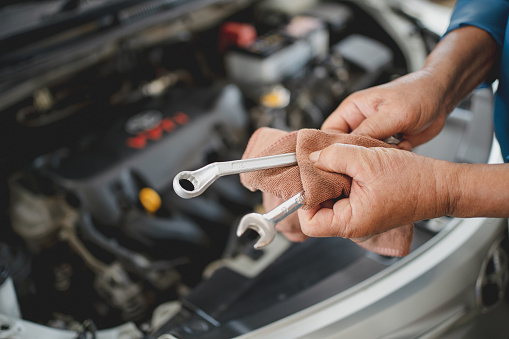Do You Have a Bad Battery—or a Failing Alternator?

If your vehicle doesn’t start or only stays on for a few minutes at a time, you might think you have a problem with the battery. Although that could be the issue, it’s also possible that the culprit could be the alternator.
The alternator sends power to your vehicle’s electrical systems and accessories, like the entertainment system and charging ports. Any extra energy that’s left over goes to re-charging the battery. Think of it this way: the battery is what starts the engine and the alternator is what provides the power. If your alternator is failing, though, it may not be able to keep the battery charged.
Common Signs of a Failing Alternator
When an alternator starts to fail, it can cause a number of electrical issues. Here are seven common signs to look for:
- Dim or overly bright lights. Failing alternators aren’t able to provide consistent voltage to electronic features, so it’s very common for the headlights to look too dim or too bright. You might also notice flickering lights or lights that switch from dim to bright (or vice-versa) erratically.
- Dead battery. A dead battery isn’t necessarily a sign of alternator issues; the battery could be nearing the end of its life, especially if it’s older. Or, you may have accidentally left your headlights on overnight. Other times, though, a dead battery can be a sign that your alternator is failing or malfunctioning.
A faulty alternator won’t be able to fully charge the battery while the engine is running, so the battery’s charge will run out faster than it normally would. To test whether it’s the battery or an alternator issue, try jumpstarting the car. If it starts up and continues to run, you’ll likely need to replace the battery soon. If the car dies soon after jumpstarting it, your battery likely isn’t getting enough power from the alternator.
- Trouble starting your car or frequent stalling. These are very common signs that the alternator is failing to charge the battery. If you try to start your engine, you may find that all you hear is some clicking. However, if your car stalls frequently when you’re out on the road, your spark plugs may not be getting enough power to keep the engine running.
- Malfunctioning accessories. If the alternator isn’t able to supply enough power to the electrical components, you may notice a number of them working slowly or malfunctioning. For example, it may take longer than usual for your windows to roll up or down. Many modern vehicles will cut off power to non-essential accessories if the alternator isn’t supplying enough electricity; this ensures things like the radio will go out before the brake lights or headlights will.
- Growling or whining sounds. If you hear a growling or whining noise coming from under the hood, the alternator could have a misaligned belt, or the belt could be rubbing on the side of the alternator’s pulley. This sound can also indicate that the rotor shaft bearings are going bad.
- Burning smells. The alternator’s drive belt is under constant tension and friction; it’s also located close to the heat of the engine. When this part starts to become worn and broken down, it can cause an unpleasant burning smell. Likewise, if the alternator is overworked or has damaged wiring, it can smell like an electrical fire.
- An illuminated battery warning light. The dashboard battery warning light can indicate a problem with the electrical system, including the alternator. If the alternator’s voltage is below or above what it needs to function correctly (generally between 13-14.5 volts), it can cause the battery warning light to come on. When this happens, you may see the battery warning light flicker on and off as the electrical load on your vehicle changes.
Don’t Get Stranded on the Side of the Road! Visit EuroCar Service for Quality Alternator Repair
If you’ve noticed any of the above signs, it’s best to have your vehicle checked as soon as possible. Alternator—and battery—issues can leave you stranded on the side of the road. If your alternator needs to be replaced, you should also replace the serpentine belt that turns it, and the belt tensioner as well. If the alternator isn’t rotating as it should, the belt that turns it won’t move freely—and that can cause excessive belt wear.
EuroCar Service offers comprehensive repairs and maintenance for all European vehicles, including Land Rover, Audi, BMW, Mercedes, Mini-Cooper, Saab, Jaguar, Volkswagen, Volvo, Smart Car, and Fiat. Call us today at 206-527-8828 or request an appointment online.





